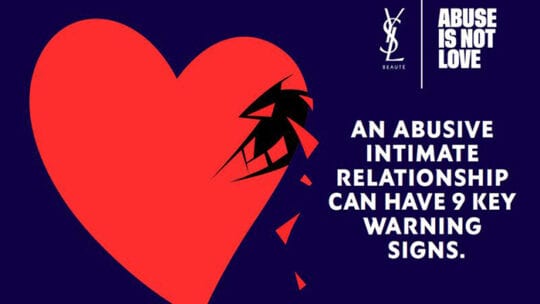
[Editor’s Note: It’s sad irony that March brings Women’s History Month and International Women’s Day (March 8), and the anniversary of the pandemic, which has resulted in more than 2.5 million deaths, but also a steep rise in domestic violence, including Intimate Partner Violence (IPV). One of the most common forms of violence against women, IPV encompasses physical, sexual, financial and emotional abuse.
Prior to the pandemic, an estimated 1 in 4 women experienced IPV. When families spend more time together, domestic violence tends to rise. Anecdotal evidence corroborates this awful reality during the pandemic.
Fortunately, late last year Yves Saint Laurent Beauty launched an ambitious, multi-pronged effort, Abuse is Not Love, around IPV.
The program aims to educate audiences, including YSL employees, help advocacy groups get out their messages and fund academic research to bolster thought leadership around prevention and youth awareness.
YSL Beauty international GM Stephan Bezy says supporting women’s emancipation is part of the brand’s history since its founder, Yves Saint Laurent, was a vocal advocate for women back in the early 1960s.
In addition, he says the effort is more than a response to IPV’s rise during the pandemic. The program will last until at 2030. His remarks were edited for space.]
PRNEWS: There are so many good causes, how and why did YSL choose this? What brand attributes does YSL believe it shares with the Abuse is Not Love campaign?
Stephan Bezy: Since our inception [in 1961], Monsieur Saint Laurent supported women’s emancipation through defying, at the time, gender norms. Supporting and fighting for women’s independence always was and remains integral to YSL’s DNA. Intimate Partner Violence (IPV) is one of the biggest threats women face. So, at YSL Beauty we want to contribute to the fight...on a global scale.
PRNEWS: We live in a cynical time. How will YSL Beauty demonstrate this is a CSR campaign, not one designed to tacitly sell product?
Bezy: The goal is long-term change and awareness. The program is not tied to sales of YSL Beauty products.
We’re demonstrating our commitment by expanding our non-profit partnerships globally, with 10 new partners coming in 2021. Our focus is to give our non-profit partners the means to help educate and stop IPV on a global scale.
We hope the public sees YSL Beauty as a committed brand, one that goes beyond product and is dedicated to using its voice to raise awareness on global issues that need visibility to help eradicate them.
PRNEWS: What tactics are you using? Since it’s global, will tactics be different based on location?
Bezy: We created ambitious communication goals [through 2030] to help spread awareness around IPV. The communication plan included a press conference, a campaign film and visuals, and a social media activation. The objective was to talk to stakeholders from press, consumers and the general public to our internal and wider [YSL parent] L’Oréal teams.
From our virtual discussion panel to displaying the signs of abuse at points of sale, the goal is to open a conversation about healthy and unhealthy relationships with as many people as possible.
Our UK and France teams amplified the message through huge outdoor campaigns, which were seen by millions. Not only that, but we’re also continuing to amplify the message through digital communication by leveraging YSL Beauty’s social media channels, and media partner digital platforms such as Snapchat.
All these touchpoints relay the key message: to know the signs of abuse as titled in our campaign, the 9 Warning Signs, to better seek or offer help. These assets are localized by each team into the local language. In addition, they take local context into account.
PRNEWS: How will you measure success?
Bezy: Through the support and collaboration of our NGO partners, our objective is to educate at least 2 million people worldwide on IPV by 2030.
In the United States, we’re working with It’s On Us to reach 60,000 young people with our new peer-to-peer education module on IPV prevention in the first year.
In the U.K., we are funding experts to educate 12,000 young people on healthy relationships through school programs over three years.
In France, our goal is to sensitize 43,000 people in year 1 through educational material and chat support.
PRNEWS: There’s a lot of noise in the world. Did your kickoff event generate the attention you wanted?
Bezy: There’s no doubt that 2020 was a challenging year for many and there are countless topics that deserve attention and awareness.
IPV has always been a societal issue but as a result of the coronavirus pandemic, the prevalence rate has increased globally, by 30-60 percent, making this an increasingly urgent concern. Globally, more than 600 million women are living in a country where intimate partner violence is not considered a crime.
Our digital panel was held [Nov. 16], ahead of the United Nations’ International Day of Elimination of Violence Against Women [Nov. 25, 2020]. We had more than 327 attendees and, to date, have received overwhelmingly positive feedback from communities across the globe.
We’re proud that as a result of our event and communication, we’re encouraging important conversations globally about the seriousness and reality of IPV and have been able to redirect people to NGO support services. n
Contact: [email protected]
